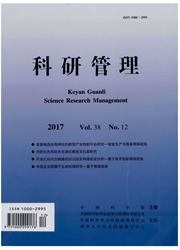

 中文摘要:
中文摘要:
企业部门间关系对组织学习能力和绩效的影响是当前组织学习领域需要研究的重要问题。本文主要探讨企业部门间关系如何对组织学习能力和绩效产生影响。我们关注的部门间关系包括部门间目标一致性、部门间建设性争论和部门间心理安全。本文认为,部门间目标一致性能够使各部门更有意愿分享各自拥有的信息和知识;部门间建设性争论使各部门更有能力进行有效的互动和思考;部门间心理安全则会促使各部门能够更无顾虑地相互分享和探讨,形成更好的工作氛围和更多的知识交流活动。因而,这三种部门间关系都会对组织学习能力和绩效产生积极的影响。本文通过调查我国企业获得的272个样本统计分析表明,这三种部门间关系都对组织学习能力都有显著正向影响,而且以组织学习能力为中介来影响组织绩效。本文从企业部门间关系的新视角探索了影响组织学习能力的因素,丰富了组织学习理论;同时本文提出的管理实践中改善优化部门间关系从而提升组织学习能力的相关措施,也具有实践意义。论文最后还对今后研究的改进提出了若干建议。
 英文摘要:
英文摘要:
The impact of inter - departmental relationship on organizational learning capability and performance in the company is an important issue in the field of organizational learning now. This paper explores the influence of inter - departmental relationship on organizational learning capability and performance. The relationship among departments in this study includes inter- departmental cooperative goal interdependence, constructive controversy and psychological safety, h is proposed that, cooperative goal interdependence can make different departments more willing to share information and knowledge, constructive controversy can make different departments more capable to interact and think effectively, psychological safety can make different departments more confident to share and explore together without worries and then build better working environment and lead to more knowledge sharing activities. Hence, these three relationships among departments will have positive effect on organizational learning capability and performance. From statistical analysis of 272 samples from Chinese companies, it is found that the above three inter -departmental relationships have significant positive influence on organizational learning capability, and meanwhile, organizational learning capability mediates the influential relationship between the three inter - departmental relationships and organizational performance. We make both theoretical and practical contributions to the field of organizational learning by exploring the influential factors for organizational learning from the perspective of inter - departmental relationships and proposing several specific management practices to improve the relationships and organizational learning capability. Finally some suggestions for future research are put forward in the paper.
 同期刊论文项目
同期刊论文项目
 同项目期刊论文
同项目期刊论文
 Trends in China’s gender employment and pay gap: estimating gender pay gaps with employment selectio
Trends in China’s gender employment and pay gap: estimating gender pay gaps with employment selectio Linking Gender Role Orientation to Subjective Career Success The Mediating Role of Psychological Cap
Linking Gender Role Orientation to Subjective Career Success The Mediating Role of Psychological Cap Effect of Organizational Politics on Employees’ Work Responsibility: Empirical Analysis Based on New
Effect of Organizational Politics on Employees’ Work Responsibility: Empirical Analysis Based on New Learning goal orientation and creative performance: The differential mediating roles of challenge an
Learning goal orientation and creative performance: The differential mediating roles of challenge an Roles of creative process engagement and leader-member exchange in critical thinking and employee cr
Roles of creative process engagement and leader-member exchange in critical thinking and employee cr Human Capital Investment in Children: An Empirical Study of Household Child Education Expenditure in
Human Capital Investment in Children: An Empirical Study of Household Child Education Expenditure in Evidence on the impact of sustained exposure to air pollution on life expectancy from China’s Huai R
Evidence on the impact of sustained exposure to air pollution on life expectancy from China’s Huai R Relational Versus Collective Identification Within Workgroups: Conceptualization, Measurement Develo
Relational Versus Collective Identification Within Workgroups: Conceptualization, Measurement Develo 期刊信息
期刊信息
